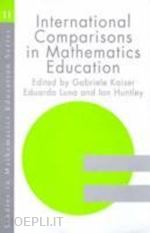Chapter 1 International Comparisons in Mathematics Education Under the Perspective of Comparative Education, Gabriele Kaiser; Part 1 Recent International Comparative Studies in Mathematics Education; Chapter 2 The Second International Mathematics Study, Kenneth J. Travers, Avrum I. Weinzweig; Chapter 3 An Overview of the Third International Mathematics and Science Study, Albert E. Beaton, David F. Robitaille; Chapter 4 Explaining TIMSS Mathematics Achievement, Curtis C. McKnight, Gilbert A. Valverde; Chapter 5 An Examination of Instructional Practices in Six Countries, Leland S. Cogan, William H. Schmidt; Chapter 6 Studying Mathematics Classrooms in Germany, Japan and the United States, Takako Kawanaka, James W. Stigler, James Hiebert; Chapter 7 The Case Study Project of TIMSS, Harold W. Stevenson; Chapter 8 Some Findings of the US-Japan Cross-cultural Research on Students’ Problem-solving Behaviours, Jerry P. Becker, Toshio Sawada, Yoshinori Shimizu; Chapter 9 Comparative Studies on Teaching Mathematics in England and Germany, Gabriele Kaiser; Chapter 10 Applications of Arithmetic in US and Chinese Textbooks, Lianghuo Fan; Part 2 What Can We Learn from International Comparative Studies in Mathematics Education?; Chapter 11 The Value of Comparative Studies, Geoffrey Howson; Chapter 12 School Mathematics, Thomas A. Romberg; Chapter 13 International Benchmarking as a Way to Improve School Mathematics Achievement in the Era of Globalization, Bienvenido F. Nebres; Chapter 14 Gender Differences in Mathematics Achievement—Here Today and Gone Tomorrow?, Gilah C. Leder, Christine Brew, Glenn Rowley; Chapter 15 Measurement Obstacles to International Comparisons and the Need for Regional Design and Analysis in Mathematics Surveys, Richard G. Wolfe; Chapter 16 The Rationality and Irrationality of International Comparative Studies, Christine Keitel, Jeremy Kilpatrick;











